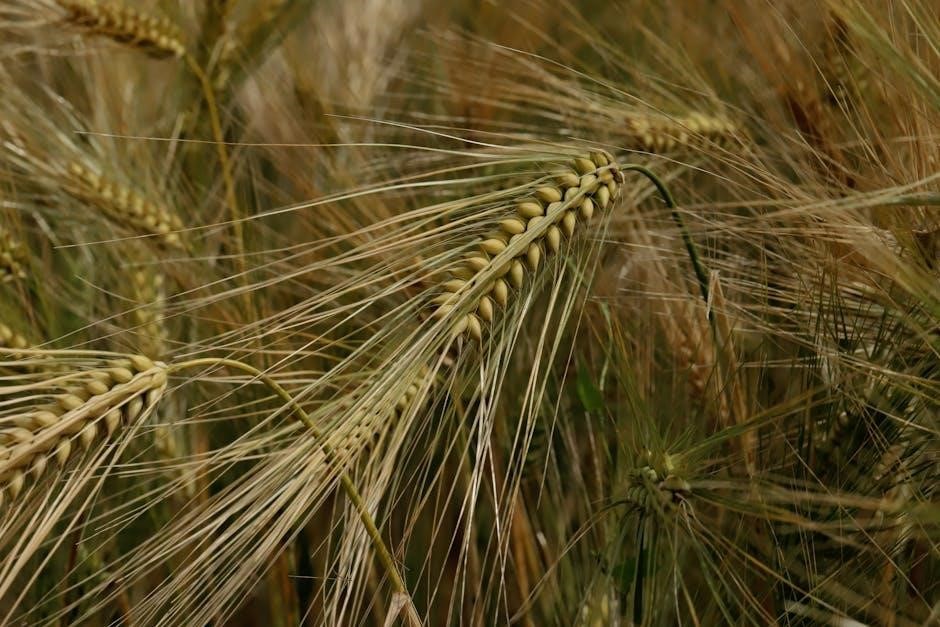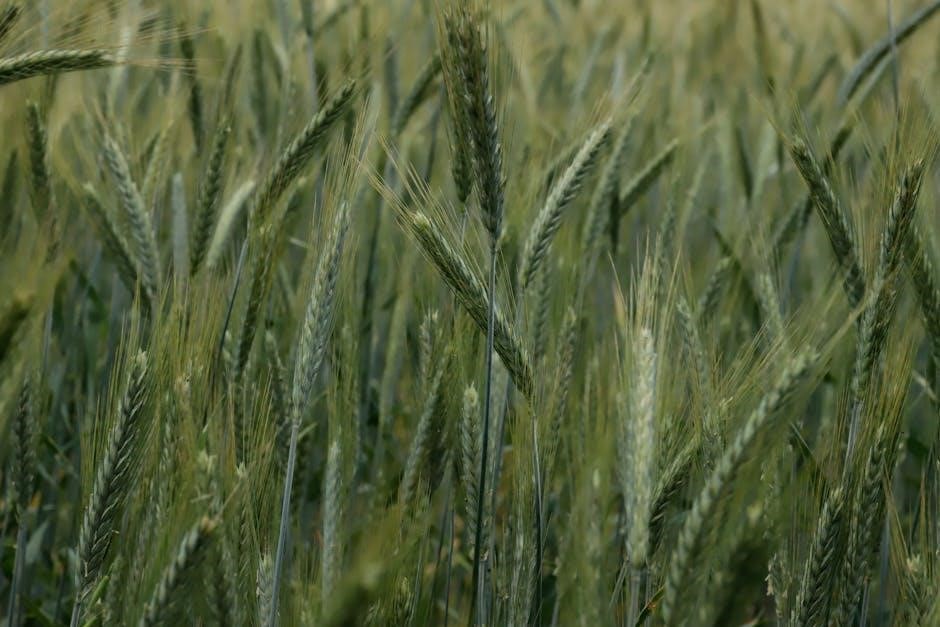In In Defense of Food, Michael Pollan critiques modern nutritionism, advocating for a return to whole foods and traditional diets․ He explores the cultural and environmental impact of our food choices, challenging readers to rethink their eating habits in a world dominated by processed foods․
Overview of the Book’s Central Argument
Micheal Pollan’s In Defense of Food critiques the Western diet and its reliance on processed foods, arguing that modern nutritionism has led society astray․ Pollan contends that the focus on individual nutrients has overshadowed the importance of whole, unprocessed foods․ He advocates for a return to traditional eating habits, emphasizing the benefits of diverse, culturally rooted diets․ By examining the science behind nutrition and the cultural significance of food, Pollan challenges readers to rethink their relationship with what they eat․ His central argument is that simple, whole foods are the key to better health and sustainability, urging a shift away from the industrialized food system․
The Importance of Understanding Food and Nutrition
Understanding food and nutrition is crucial for making informed choices about what we eat․ Pollan highlights how the modern diet has shifted from whole, nutrient-rich foods to processed products dominated by sugar, salt, and unhealthy fats․ This transformation has led to widespread health issues, including obesity, diabetes, and heart disease․ By recognizing the difference between real food and edible products, individuals can reclaim control over their diets․ Pollan emphasizes the need to understand the cultural, biological, and ecological significance of food, advocating for a return to traditional eating practices․ This knowledge empowers people to prioritize whole foods, fostering better health and a deeper connection to the food they consume․
Why the Book is Relevant in Today’s Health Landscape
In Defense of Food remains highly relevant in today’s health landscape, offering a critical perspective on the nutrition industry․ Pollan’s arguments resonate as people grapple with conflicting dietary advice and rising rates of chronic diseases․ The book challenges the dominance of processed foods and the misleading health claims that accompany them․ By advocating for a return to whole, unprocessed foods, Pollan provides a clear path amid the confusion․ His critique of nutritionism and the food industry’s practices is particularly timely, as consumers increasingly seek transparency and healthier options․ The book’s emphasis on sustainable eating and cultural food traditions also aligns with growing concerns about environmental impact and public health, making it a vital resource for anyone seeking to navigate the modern food system wisely․
The Problem with Modern Nutritionism
Modern nutritionism oversimplifies food into nutrients, fostering confusion and unhealthy trends․ This reductionist approach has led to diets focused on individual components rather than whole foods, undermining true nutrition․
Critique of the Western Diet
The Western diet, dominated by processed foods, added sugars, and refined carbohydrates, has led to a public health crisis․ Pollan argues that this diet, focused on convenience and profit, has prioritized short-term gains over long-term health․ He highlights how the over-reliance on industrialized food products has contributed to rising rates of obesity, diabetes, and heart disease․ Pollan critiques the nutritional science that underpins these diets, asserting that it often oversimplifies complex dietary needs․ He emphasizes the failure of the Western diet to address the broader cultural and environmental contexts of eating, advocating instead for a return to whole, unprocessed foods and traditional eating habits․ This critique forms the foundation of his call for a more mindful and sustainable approach to food․
The Role of Science in Shaping Dietary Trends
Science has significantly influenced modern dietary trends, often with unintended consequences․ Pollan examines how nutritional science, driven by the reductionist approach of identifying individual nutrients, has led to fad diets and conflicting recommendations․ This focus on “good” and “bad” nutrients, such as cholesterol or fats, oversimplifies the complexity of human nutrition․ Scientific studies, often funded by industries with vested interests, have shaped public perception and dietary guidelines․ Pollan argues that this narrow, industry-driven approach has undermined traditional wisdom about food and eating․ He advocates for a more holistic understanding of nutrition, emphasizing the importance of whole foods over isolated nutrients․ This critique highlights the need for a balanced perspective that considers both scientific evidence and cultural knowledge in shaping healthier dietary practices․

The Misconception of “Good” and “Bad” Foods
Pollan challenges the simplistic categorization of foods as “good” or “bad,” a concept deeply ingrained in modern dietary culture․ This binary labeling, often fueled by marketing and fad diets, oversimplifies the complexities of nutrition․ Foods are not inherently moral but are transformed into such by cultural and commercial forces․ The “good” and “bad” labels have led to cycles of guilt and indulgence, fostering an unhealthy relationship with eating․ Pollan advocates for a more nuanced approach, emphasizing the importance of balance and variety․ He encourages readers to move beyond this moralistic framework and focus on the quality and wholesomeness of the foods they consume, rather than assigning ethical value to individual ingredients or dishes․

The Importance of Food Culture
Food culture preserves traditions, fosters community, and enriches lives beyond sustenance․ It emphasizes shared meals, seasonal ingredients, and the joy of cooking, countering the rise of processed foods․
Traditional Diets and Their Benefits
Traditional diets, such as the Mediterranean, Japanese, and Indian cuisines, emphasize whole, unprocessed foods, seasonal ingredients, and communal eating․ These diets often feature diverse plant-based dishes, whole grains, and healthy fats, promoting longevity and well-being․ Studies show they reduce chronic disease risks, like heart disease and diabetes, due to their nutrient-dense and balanced composition․ Pollan highlights how these diets foster cultural identity and social bonding, contrasting with the isolating nature of modern fast food․ By adhering to centuries-old culinary practices, traditional diets preserve food wisdom and promote sustainable eating habits, offering a healthier alternative to the Western diet’s processed and nutrient-poor options․ They remind us that food is not just fuel but a celebration of heritage and community․ Embracing these traditions can lead to better health and a deeper connection to our cultural roots․
The Decline of Home Cooking and Its Impact
The decline of home cooking has profoundly impacted modern health and culture․ With increasingly busy lifestyles, many rely on processed and convenience foods, leading to poorer nutritional outcomes․ Home cooking, once a cornerstone of family life, has been replaced by fast food and takeout, contributing to rising rates of obesity, diabetes, and heart disease․ Pollan argues that this shift has eroded culinary skills and communal dining traditions, weakening family bonds and cultural identity․ The loss of home cooking also perpetuates a cycle of dependence on industrial food systems, further disconnecting people from the origins and quality of their food․ By reclaiming the kitchen, individuals can regain control over their diet, fostering healthier habits and stronger connections to their heritage and community․ This decline underscores the need for a renewed emphasis on cooking as a vital life skill․
Cultural Significance of Food Beyond Nutrition
Food extends far beyond its role as sustenance, carrying deep cultural, emotional, and social significance․ Pollan emphasizes that meals are not just about calories or nutrients but serve as a medium for connection and identity․ Traditional cuisines often reflect a community’s history, values, and environment, preserving cultural heritage through recipes and practices passed down generations․ The shared act of eating fosters bonds, creating moments of joy and unity․ Industrialization has eroded this cultural richness, reducing food to a commodity rather than a source of meaning․ By valuing food’s cultural dimensions, we can reclaim not only our health but also our shared humanity and the stories that define us․ This perspective highlights the need to preserve and celebrate food’s role in enriching our lives beyond mere nutrition․
Alternatives to the Western Diet
Pollan explores non-Western dietary approaches, emphasizing plant-based and traditional diets․ The Mediterranean diet, with its focus on olive oil, whole grains, and vegetables, serves as a prime example, promoting longevity and well-being․ Similarly, other global cuisines highlight the importance of diversity and nutrient-rich, unprocessed foods, offering sustainable alternatives to the Western diet’s reliance on industrialized products․ These approaches not only improve health but also foster a deeper connection to food and culture, aligning with Pollan’s advocacy for mindful, environmentally conscious eating habits․ By adopting these models, individuals can move away from the destructive patterns of modern nutritionism․ Pollan’s insights encourage a shift toward more balanced and culturally rooted eating practices․
Exploring Plant-Based Diets
In In Defense of Food, Michael Pollan highlights the benefits of plant-based diets, emphasizing their alignment with traditional eating patterns․ He argues that diets rich in fruits, vegetables, and whole grains promote health and reduce chronic disease risks․ Pollan critiques the Western diet’s over-reliance on processed foods and animal products, advocating for a shift toward more natural, plant-centric meals․ He draws on examples from various cultures, such as the Mediterranean diet, to illustrate the longevity and well-being associated with these practices․ Pollan also addresses the environmental impact of plant-based eating, noting its potential to reduce greenhouse gas emissions and promote sustainable agriculture․ By focusing on whole, unprocessed foods, plant-based diets offer a healthier and more ecologically friendly alternative to modern industrialized nutrition․ Pollan’s exploration encourages readers to adopt a more mindful and sustainable approach to their dietary choices․
The Mediterranean Diet as a Model
The Mediterranean diet serves as a cornerstone in Michael Pollan’s argument for traditional eating in In Defense of Food․ This diet, characterized by high consumption of olive oil, fruits, vegetables, and whole grains, is linked to lower rates of heart disease and longevity․ Pollan highlights its emphasis on communal meals and seasonal ingredients, contrasting it with the Western diet’s focus on processed foods․ The Mediterranean approach is not just a dietary pattern but a cultural practice that fosters a deeper connection to food and community․ By embracing this model, individuals can move away from the nutrient-focused mindset of modern nutritionism and toward a more holistic, enjoyable way of eating․ Pollan underscores the Mediterranean diet as a testament to the benefits of adhering to time-tested culinary traditions․ This approach aligns with his broader advocacy for whole, unprocessed foods․
Other Traditional Diets from Around the World
Beyond the Mediterranean, other traditional diets offer insights into healthy eating․ The Japanese diet, rich in seafood, soy, and fermented foods, emphasizes balance and longevity․ Similarly, the Indian diet, with its diverse use of spices and whole grains, highlights the importance of Ayurvedic principles․ The Nordic diet, focusing on local ingredients like fish, rye, and berries, underscores regional adaptability․ These diets share common themes: reliance on whole, unprocessed foods; vibrant plant-based ingredients; and culinary practices rooted in culture․ Pollan argues that these traditions provide a blueprint for escaping the pitfalls of modern nutritionism․ By studying these diets, readers can better understand how to eat in ways that nourish both body and soul, aligning with Pollan’s call to reclaim food’s cultural and ecological significance․ This diversity of diets reinforces the idea that healthful eating is timeless and universally accessible․

Rethinking Nutrition Science
Pollan challenges the reductionist view of nutrition, emphasizing whole foods over nutrient-by-nutrient approaches․ He advocates for a holistic understanding of diet, blending tradition with scientific insight to promote health and sustainability․
Understanding Nutrients Beyond Calories
In In Defense of Food, Pollan argues that focusing solely on calories oversimplifies nutrition․ He emphasizes the importance of understanding the complex interplay of vitamins, minerals, and phytochemicals in whole foods․ Rather than viewing food as mere energy sources, Pollan advocates for recognizing the broader nutritional and health benefits of ingredients like fiber, antioxidants, and essential nutrients․ By shifting the focus from calorie counting to nutrient-dense foods, individuals can make more informed dietary choices that support overall well-being․ This approach aligns with traditional diets, which often emphasize variety and balance over reductionist nutritional strategies․
The Role of Fiber and Whole Foods
Pollan highlights the critical role of dietary fiber and whole foods in maintaining health․ Unlike processed foods, which often lack essential nutrients, whole foods provide a natural balance of vitamins, minerals, and fiber․ Fiber, in particular, is vital for digestive health, promoting beneficial gut bacteria and preventing chronic diseases like heart disease and diabetes․ By emphasizing whole foods, Pollan argues that individuals can avoid the pitfalls of modern nutritionism, which often prioritizes isolated nutrients over the holistic benefits of unprocessed ingredients․ This approach not only supports physical health but also fosters a deeper connection to the food we eat, encouraging a more mindful and sustainable relationship with our diet․
Debunking Common Dietary Myths
Pollan challenges widespread dietary myths, such as the belief that all fats are harmful or that low-fat diets lead to weight loss․ He argues that the demonization of specific nutrients has led to confusion and unhealthy eating habits․ For instance, the focus on reducing cholesterol has resulted in increased consumption of processed foods labeled as “low-fat,” which often contain harmful additives․ Pollan emphasizes that the quality of food matters more than the quantity of any single nutrient․ By rejecting overly simplistic dietary advice, individuals can adopt a more balanced approach to eating, focusing on whole, unprocessed foods rather than following fleeting trends in nutrition science․

The Food Industry’s Impact on Health
The food industry manipulates nutrition science to market processed foods, often prioritizing profit over health․ This fosters dietary confusion and contributes to chronic diseases, undermining public well-being․
How Processing Affects Food Quality
Food processing often strips foods of essential nutrients, replacing them with artificial additives and preservatives․ This transformation can lead to products that are high in calories but low in nutritional value․ Pollan argues that such processed foods are designed to be irresistibly appealing, exploiting human cravings for salt, sugar, and fat․ The result is a diet that promotes overeating and contributes to chronic health issues like obesity and diabetes․ Furthermore, processing can disrupt the natural balance of nutrients, making it harder for the body to function optimally․ By prioritizing convenience and shelf life, the food industry sacrifices the inherent quality of whole foods, undermining public health․
Marketing Strategies and Consumer Deception
Food marketers often employ misleading tactics to sell processed products, exploiting consumer trust in labels like “natural” or “healthy․” These terms, frequently unregulated, create a false impression of nutritional value․ Pollan highlights how companies use sophisticated branding and packaging to appeal to health-conscious shoppers, even when products are nutrient-poor․ Misleading health claims, such as “low-fat” or “high-fiber,” distract from the presence of harmful ingredients․ Additionally, marketing campaigns often target vulnerable populations, like children, with colorful packaging and appealing characters, fostering unhealthy preferences early in life․ Such deceptive practices contribute to a fragmented food culture, where consumers are led away from whole, nourishing foods toward profitable, industrially produced alternatives that undermine public health and well-being․
Economic Factors Influencing Food Choices
Economic factors significantly shape food choices, with affordability and accessibility often dictating dietary decisions․ Processed and fast foods are frequently cheaper than whole, nutrient-dense options, making them more accessible to lower-income populations․ Agricultural subsidies for commodity crops like corn and soybeans further skew the market, keeping processed foods affordable while inflating the cost of fresh produce․ Pollan argues that these economic disparities perpetuate unhealthy eating patterns, disproportionately affecting marginalized communities․ The food industry capitalizes on these trends, prioritizing profit over nutrition․ As a result, many consumers opt for convenient, budget-friendly options despite their negative health impacts․ This economic reality underscores the systemic challenges in achieving a healthier diet, emphasizing the need for policy changes to level the playing field and make whole foods more attainable for all․
Personal Responsibility in Food Choices
Empowering individuals to make informed decisions about their diet is crucial․ Pollan emphasizes the importance of mindful eating and resisting the allure of processed foods․
Empowering Individuals to Make Better Decisions
Pollan emphasizes that individuals have the power to improve their health by making informed food choices․ Education plays a key role in this process, as understanding the difference between whole foods and processed products is essential․ He advocates for a balanced approach, warning against the pitfalls of “orthorexia,” or an unhealthy obsession with healthy eating․ By focusing on traditional diets and avoiding overly complicated nutritional advice, individuals can simplify their decisions․ Pollan also encourages a deeper connection with food, emphasizing the importance of cooking and sharing meals․ This empowerment allows people to resist the influence of the industrial food system and cultivate healthier, more sustainable eating habits․ Ultimately, Pollan believes that personal responsibility, combined with awareness, can lead to meaningful change․
The Role of Mindful Eating
Mindful eating is a central theme in Pollan’s approach to food, encouraging individuals to engage fully with their meals․ This practice involves paying attention to the sensory experiences of eating, savoring flavors, and recognizing hunger and satiety cues․ By slowing down and eliminating distractions, mindful eating helps reduce overeating and fosters a healthier relationship with food․ Pollan argues that this process allows individuals to reconnect with their natural appetites and make more intentional choices․ He also highlights the cultural benefits of mindful eating, such as strengthening social bonds through shared meals․ Ultimately, mindful eating is not just a dietary strategy but a way to reclaim the joy and satisfaction of eating in a fast-paced, industrialized food culture․

Setting Realistic Goals for Dietary Change
Pollan emphasizes the importance of setting achievable goals when transitioning to a healthier diet․ Rather than adopting restrictive or extreme measures, he advocates for gradual changes that prioritize whole, nutrient-dense foods․ This approach helps individuals avoid the pitfalls of fad diets and fosters long-term sustainability․ By focusing on incremental shifts, such as increasing vegetable intake or reducing processed food consumption, people can create lasting habits․ Pollan also stresses the value of self-compassion, allowing for occasional indulgences without guilt․ Setting realistic goals not only makes dietary change more manageable but also empowers individuals to take control of their health in a way that aligns with their lifestyles and preferences․ This balanced strategy promotes overall well-being and discourages the cycle of dieting failures․

Sustainability and Food Systems
Pollan highlights the environmental impact of industrial agriculture, urging a shift toward sustainable practices that prioritize local, seasonal foods and reduce carbon footprints․
The Environmental Impact of Food Production
In In Defense of Food, Pollan examines how industrial agriculture devastates ecosystems, relying on chemical pesticides, synthetic fertilizers, and monocultures that deplete soil health․ He highlights the significant contribution of factory farming to greenhouse gas emissions, deforestation, and water pollution․ Pollan argues that sustainable practices, such as organic farming and permaculture, can mitigate these harms while preserving biodiversity․ By advocating for local and seasonal food systems, he emphasizes the importance of reducing transportation-related carbon footprints․ The book underscores the urgent need to align food production with environmental stewardship, ensuring a healthier planet for future generations․
Sustainable Practices in Agriculture
Pollan champions sustainable farming methods in In Defense of Food, emphasizing practices like crop rotation, composting, and polyculture to restore soil fertility and biodiversity․ He advocates for reducing reliance on chemical inputs, promoting instead natural pest control and organic fertilization․ These approaches not only enhance environmental health but also produce nutrient-rich foods․ Pollan highlights the importance of supporting small-scale, local farmers who prioritize ecological balance over industrial efficiency․ By adopting these practices, agriculture can become a regenerative force, replenishing ecosystems while ensuring long-term food security․ His vision aligns farming with nature, fostering a healthier relationship between land, food, and people․
Supporting Local and Seasonal Foods
Pollan emphasizes the value of supporting local and seasonal foods in In Defense of Food, arguing that they offer fresher, more flavorful, and nutritionally superior options․ By choosing foods grown nearby, consumers reduce carbon footprints associated with long-distance transportation․ Seasonal eating also reconnects people with natural cycles, promoting diversity in diets and supporting local economies․ Pollan encourages visiting farmers’ markets and participating in community-supported agriculture programs to strengthen ties between producers and consumers․ This approach fosters a more sustainable food system, preserving culinary traditions and ensuring access to high-quality, culturally relevant foods․ Prioritizing local and seasonal options is a simple yet impactful step toward healthier eating and environmental stewardship․

Pollan concludes by urging readers to adopt a balanced, mindful approach to eating, emphasizing whole foods and traditional diets․ He calls for collective action to advocate for better food policies and sustainable practices, ensuring healthier communities and a more resilient food system for future generations;
Summarizing Key Takeaways
In Defense of Food challenges readers to rethink their relationship with food, emphasizing the importance of whole, unprocessed foods over nutrient-focused diets․ Pollan critiques the Western diet’s reliance on science-driven nutritionism, which has led to confusion and poor health outcomes․ He advocates for a return to traditional eating practices, highlighting the benefits of diverse, culturally rich diets․ The book underscores the environmental and social consequences of industrial food systems, urging individuals to make informed choices․ Ultimately, Pollan calls for a shift from a diet-centric mindset to one that values food as a source of nourishment, community, and sustainability․ By embracing these principles, readers can foster healthier lives and a more resilient food future․
Encouraging a Balanced Approach to Eating
Pollan advocates for a balanced approach to eating, emphasizing moderation and variety․ He suggests focusing on whole foods rather than adhering to strict dietary rules․ By avoiding extremes and embracing traditional meals, individuals can cultivate healthier relationships with food․ Pollan also highlights the importance of mindfulness, encouraging readers to savor their meals and enjoy the social aspects of eating․ This balanced approach not only promotes physical well-being but also enriches emotional and cultural connections to food․ By prioritizing quality over quantity and fostering a deeper appreciation for nourishment, Pollan’s philosophy offers a sustainable and fulfilling way to eat․
Advocating for Better Food Policies
Pollan calls for systemic changes in food policies to support healthier, sustainable food systems․ He argues that current policies often favor industrial agriculture and processed foods, contributing to public health crises․ By reforming subsidies and regulations, governments can incentivize the production and distribution of whole, nutrient-rich foods․ Pollan also emphasizes the need for transparency in food labeling and marketing to empower consumers․ Additionally, he advocates for programs that make fresh, locally grown foods accessible to all, regardless of income․ These policy changes would create a food system that prioritizes health, environmental sustainability, and equity, fostering a healthier society for future generations․
